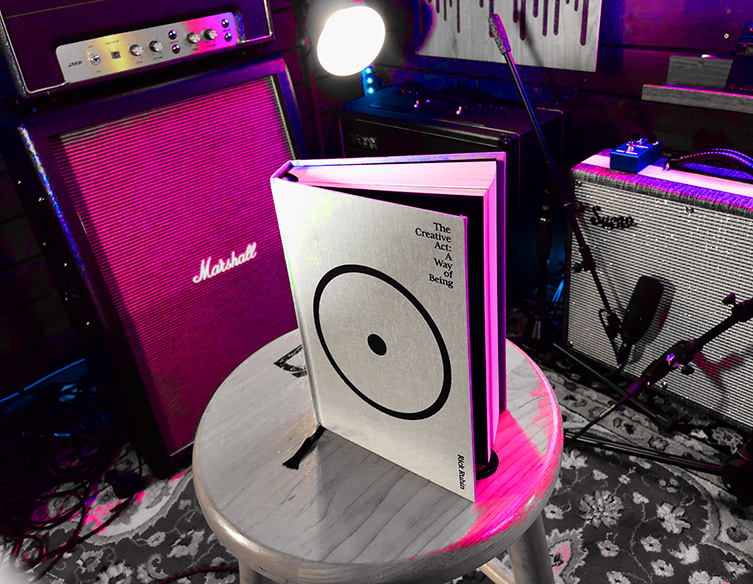What Does Rick Rubin Do?
What exactly does Rick Rubin do?
Everyone who listens to modern music knows his name. In fact, everyone who listens to modern music will undoubtedly love at least one song or album that he’s been involved in. But he isn’t really a songwriter, nor is he much of an engineer in the traditional knob-twiddling sense.
So what does Rick Rubin do?
It’s a relatively tough question to answer, given how ubiquitous he is. Maybe a look through his timeline from a ‘key songs’ perspective could help shed some light on the subject? Let’s do it!
Contents
American Recordings - Career Resurrector
What Does Rick Rubin DO Though?
Rick Rubin’s Early Career
Frederick Jay Rubin was in his early twenties when he established himself as an eclectic and influential force in the music industry. A member of several punk bands in his youth, he was drawn to hip-hop in the early 80s and actually formed Def Jam Records whilst at college. Getting into hip-hop production, he released work by local artists before teaming up with NYC promoter Russell Simmons to form Def Jam.
Their first release was I Need a Beat, the debut single of LL Cool J. Rubin’s ear for an emerging sound saw him sign Public Enemy to Def Jam, who of course became one of hip-hop’s most pioneering and influential groups. He was involved with their first two records, which 100% changed and then defined the landscape for rap music everywhere.
Rick’s influence on hip-hop culture increased, with releases by Jazzy Jeff, Hollis Crew and Run-DMC all occurring in the early to mid 80s. He was also instrumental in gently pushing the nascent Beastie Boys in the direction of rap, away from their punk rock roots. This decision inadvertently created yet more game-changing music as the Beastie Boys made a sizable impact on the world. Licensed to Ill demonstrated Rubin’s first experiments in mixing hard rock with hip-hop, a good decade ahead of the nu-metal phenomenon.
One of Rubin’s most inspired mash-up moments was actually suggested by his friend, the SPIN editor Sue Cummings. Bringing the worlds of rock and rap closer together than ever before, his collab/reimagining of Aerosmith’s Walk This Way added verses by Run-DMC and a hip-hop feel to the drums. Is this the definitive version of the song? Most definitely. Had the world heard anything quite like this before? Not really, no!
Rubin Brings the Rock
One of the most curious moves Rubin made in the 80s - after becoming huge for producing rap records - was to produce Slayer’s Reign in Blood album. We’ve already seen how rock elements had crept into his productions, but Slayer were quite a few degrees harder and more intense that what he’d offered up until that point.
This is our first real clue that genre isn’t necessarily a huge factor in his process. What was, though? I’m thinking perhaps ‘accessibility’, a term which I use with certain reservation in this instance, given that Reign in Blood starts off with a tune about the Nazi ‘doctor’ Josef Mengele!
Take a closer look though, and this third album from Slayer is altogether tighter, quicker and meaner than anything they’d produced before. The songs are faster - the average song bpm is 200 for goodness’ sake! - and the whole record clocks in at a zippy 29 minutes. Clearly, hip-hop’s preference for quickly getting to the point is reflected here!
The production is cleaner than Slayer’s previous outings, which actually serves to make them sound even more ferocious! Here’s guitarist Kerry King’s take on it: "It was like, 'Wow—you can hear everything, and those guys aren't just playing fast; those notes are on time.”
Around this time, Rubin also produced Electric by The Cult. Interestingly, he was hired specifically to remodel the band’s goth-rock vibe into a more mainstream hard rock sound. It’s curious because he was very much a hip-hop guy before Reign in Blood, and Slayer’s sound was hardly what The Cult were after! I wonder what they expected him to come up with?
Nevertheless, Rubin got to work, in a way that was so direct that it’s a mix of genius and funny, from what engineer Tony Platt recalls:
Rick Rubin was recording the Cult in Studio A and we (Platt and the studio engineers) stood in the airlock just outside the studio. A snatch of Highway to Hell would get played and then a snatch from Back in Black and then a snatch of Led Zeppelin, and we thought, "What the hell's going on there?" (A studio assistant) said, "Well, he's getting the guitar sounds from Back in Black, the drum sound from Highway to Hell and the voice sound from Led Zeppelin!" Literally, as he was mixing he was getting a guitar sound on the Cult and then comparing it directly with the guitar sound that he wanted to get from Back in Black. The same with all the other instruments.
It’s almost too obvious for words, but he got the results that everybody wanted!
American Recordings - Career Resurrector
Rick Rubin left Def jam in 1988 and moved to LA, where he founded Def American Recordings. This became simply American Recordings in 1993 when Rubin realised that ‘def’ had been co-opted into the mainstream, thus losing its uniqueness. He continued to sign a mixture of hip-hop and rock acts, and the most famous of these early 90s albums is undoubtedly Blood Sugar Sex Magic by the Red Hot Chili Peppers. Tempering their breathless funk workouts with solid stabs of songwriting, Rubin helped the Chilis create a blueprint for their music that some might say hasn’t changed or developed since.
This classic album was recorded at The Mansion, a luxurious Laurel Canyon residence that has become somewhat mythical in itself. Blood Sugar put the Chilis on the world’s map like never before, and offered further proof that Rubin had that elusive Midas touch when it came to albums that resonated with the public.
After this period, the most notable early-mid 90s work would be when Rubin reached into the past to dust off the lapels of mature stars whose once-stellar careers had stalled or declined. Chief amongst these was Johnny Cash, whose six volumes of music for American Recordings brought about a huge resurgence of interest in him, not to mention hugely broadening Rubin’s own cultural cache and relevance.
These albums were a mix of new material (often written by other writers for Cash) and inspired covers, chosen mainly by Rubin. Many of these boldly reinvented the meaning of each song, particularly Nine Inch Nails’ Hurt and Soundgarden’s Rusty Cage. Who would ever have imagined the Man in Black playing such songs? Under Rubin’s control, though, these songs proved to be highly resonant with the ageing legend, and Cash’s career enjoyed a huge late period revival.
Rubin repeated this concept with other artists such as Tom Petty and even Neil Diamond, whose Twelve Songs record contained specially imposed limitations (by Rubin) on the production, such as ‘no backing vocals’ and ‘no drums’. It was yet another hit!
Modern Rock Tastemaker
Alongside Rubin’s long-time relationship with the Chili Peppers (six albums’ worth), he’s also been at the vanguard of a great deal of the most significant hard rock of the last few decades. From producing multiple records for System of a Down and Linkin Park (the acceptable faces of nu-metal?) to production credits for Rage Against the Machine, The Mars Volta, Audioslave and Weezer - amongst many others - his finger has definitely been on the pulse of what mattered, and what lasted.
Perhaps reprising his earlier taste for crushing metal, he has continued to be involved with significant releases from top tier metal bands: Slipknot’s Volume 3: The Subliminal Verses and Black Sabbath’s comeback album 13 would be great examples of this. Clearly, the criteria for his collaboration is creativity, not any particular sound or scene.
Even More Defining Hip Hop
Characteristically, during his time producing epic rock albums, Rubin also found the time and headspace to be involved in more significant hip-hop music, including modern classics like Saul Williams’ Amethyst Rock Star, the Wu-Tang Clan’s A Better Tomorrow and of course 99 Problems by Jay-Z. Talk about dominating?
What Does Rick Rubin DO Though?
So that’s a small snapshot of Rick Rubin’s huge career, but if he isn’t a hands-on engineer, and he isn’t actively writing songs, then what is his magic touch all about?
Well, let’s get some opinions here. Dan Charmas, the ex vice president of A&R at American Recordings, says: "He's fantastic with sound and arrangements, and he's tremendous with artists. They love him. He shows them how to make it better, and he gets more honest and exciting performances out of people than anyone."
Dr Dre tells us that Rubin is: "hands down, the dopest producer ever that anyone would ever want to be, ever", without actually elaborating!
Not everyone shares this opinion, though. Slipknot’s vocalist Corey Taylor - a man never known to mince his words - has remarked on his experience: "We were being charged horrendous amounts of money. And for me, if you're going to produce something, you're fucking there. I don't care who you are! The Rick Rubin of today is a shadow of the Rick Rubin that he was. He is overrated, he is overpaid, and I will never work with him again."
Taylor later apologised for his outburst, but it certainly demonstrates that not everyone is a fan of his ‘hands off’ methods. Another critical artist was Black Sabbath’s Geezer Butler: "I still don't know what he did. It's, like, 'Yeah, that's good.' 'No, don't do that.' And you go, 'Why?' And he'd say, 'Just don't do it.'"
Rick Rubin Today
Nobody can keep up a work schedule like Rick Rubin, and neither can Rick Rubin, it seems! Such a prodigious workrate is bound to slow down somewhat after three decades, and it looks like Rubin is being more selective with his projects these days. Whilst less hectic than other years, the last few have still seen him helm the latest Chilis record as well as working on music with Neil Young, Smashing Pumpkins, Kesha, the controversial Travis Scott and some upcoming work with Gossip.
Where will he go next? Well, that’s anybody’s guess, but clues may be found in the book he published a year or so ago. The Creative Act: A Way of Being is a sort of self-help/art practice book that shares many of Rubin’s thinking and working practices. Readers are encouraged to use what resonates with them, and ignore what doesn’t. Could there be answers here? There’s only one way to find out!

However you regard Rubin’s idiosyncratic way of working, there’s no doubt of his influence. Modern music - well, popular American music, shall we say - just would not be or sound the same without his particular sensibility and set of skills. He’s a major force in the rock world, the rap world, and the whole pop music world: a force that cannot be underestimated. In reality, there’s nobody else out there quite like him.
But what does Rick Rubin do?
He helps the biggest artists in the world deliver their trademark records. Simple!













